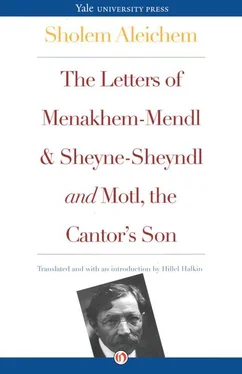It’s a miracle they let her in with those eyes — to say nothing of surviving the sea voyage. The times we saw the Angel of Death face to face! The times we said good-bye to life!
Everything seemed fine and dandy when we boarded the Prince Albert. My friend Mendl and I explored the ship from prow to stern. We couldn’t have been more thrilled. Picture living in a three-story house on water! You take a turn around the deck with your hands in your pockets and you’re traveling to America. You stop to have a drink and you’re traveling to America. You sleep in a bed at night and you’re still traveling to America. And the people — a whole city! They’re all traveling to America like you and everyone knows everyone in no time. You find out more about a person in a day than you normally would in a year.
Whew! The number of women my mother, Brokheh, and Taybl have made friends with! That’s nothing, though, compared to Elye and Pinye’s new friends. They talk on and on. The women discuss household things: kitchens, pantries, laundry, linens, socks, pillowcases. The men talk about America, jobs, Columbus, anti-Semitism, pogroms.
A person might think they couldn’t live without pogroms. I’ve told you I don’t like to hear about them. The minute someone starts on a new one, I’m off. I take Mendl by the hand and we go for a walk in the streets of the Prince Albert.
The Prince Albert is a big, fine-looking ship. It has marble stairs, brass railings, and lots of iron and steel. And the crew! Some are stewards and some are sailors, a whole bunch of them. They run around all over. Mendl and I are green with envy. We promise each other that we’ll go to sea when we grow up.
The one thing wrong with the Prince Albert is that you’re not allowed everywhere. Try going beyond the steerage deck and you’re chased away. The sailors are a rotten bunch. And the first-class passengers are no better for letting the sailors behave like that. Are they afraid we’ll bite them? Mendl doesn’t like it one bit. He can’t understand why a ship needs different classes. America has no classes, he says. If I don’t believe him I can ask my brother Elye.
Elye hates those kind of questions. It’s better to ask Pinye. Pinye loves to talk about such things. He’ll bombard you with words. Get Pinye started and he’s like an alarm clock that keeps going until it runs down.
I found Pinye sitting on deck with his nose in a book. Pinye doesn’t read with his eyes. He reads with the tip of his nose. That’s because he’s nearsighted. When I was practically on top of him I said: “Pinye, I have a question.”
Pinye took his nose from the book.
“What’s up, little man?”
“Little man” is Pinye’s name for me. I mean it’s his name when he’s in a good mood. He’s almost always in a good mood, even when he’s fighting with Elye or Taybl is sulking.
I asked Pinye if Mendl was telling the truth.
You should have seen him catch fire and shoot sparks! Why, America, he said, is the only country in the world with real freedom and equality. Only in America can you be sitting with the President on one side of you, and a bum, a down-and-outer, on the other, and next to the bum is a millionaire. Civilization! Progress! Columbus!
Pinye cut loose with his biggest words. A Jew standing next to us, a stranger, mixed in:
“If it’s such a wonderful country and everyone is so equal, how come there are down-and-outers and millionaires? You’re not being logical.”
But let Pinye fight his own battles. I had found out what I wanted to know. Mendl was right. There are no classes in America. Classes are bad. So are first- and second-class passengers. Just don’t ask me why. What have they ever done to me?
Mendl says: “Who do those fat cats think they are shutting themselves up with a lot of shiny mirrors? Do they think they’re too good for the likes of us lower-deckers? Aren’t we human too? Don’t we all pray to the same God?”
In the end, they got their comeuppance. It happened on the night of Yom Kippur, when the upper crust had to stoop and join us in steerage.
Since the Prince Albert sailed after Rosh Hashanah, we spent Yom Kippur at sea. Our last meal before the fast was roast potatoes. All our meals were potatoes, because the Prince Albert had no kosher kitchen. There was also bread and tea with sugar. I tell you, it wasn’t half bad. I could live on nothing else for a whole year. Brokheh says too many potatoes make you fat. But what doesn’t Brokheh say? When did Brokheh ever like anything?
She didn’t like the Prince Albert either. She said it was too slow. Who ever heard, she said, of a single trip taking ten days?
We tried explaining that it was because of the ocean, not the ship. Pinye pointed out that there’s three times more water than land in the world. Elye said it’s only two times. He knows his geography, he said. The world is two-thirds water and one-third land. That means twice as much water. “Three times,” Pinye said. “Twice,” insisted Elye. “Three times!” “Twice!” They fought for a while and made up.
Who would be the cantor on Yom Kippur? My brother Elye, of course. Not that he was ever a cantor before, but his father was a famous one. And he has a good voice and knows Hebrew — what more could anyone want? Pinye had the whole ship begging Elye to sing the Kol Nidrei. He spread the word that the young man with the blond beard — that’s Elye — is a musical wonder. You should hear him pray! Not to mention the little man who is his brother (that’s me!) and sings a mean soprano. It’s enough to make God himself take voice lessons.
It didn’t matter how much Elye tried begging off or swore he had never been a High Holy Day cantor. Nothing in the world could get him out of it. He was practically dragged to the prayer stand — I mean to a round table covered with a white sheet. Pinye said to me:
“Let’s go, little man. Get to work!”
We gave those passengers a Kol Nidrei to remember!
But the Kol Nidrei was nothing compared to the prayers that came after. There wasn’t a dry eye in the house. It started with some sighing and throat-scraping. Then came the quiet sniffles. That led to the blowing of noses, which grew so loud after a while that the whole place was bawling its head off. Everyone was thinking of where he had been a year ago — in his own town by his own prayer stand in his own synagogue with its own cantor and choir boys.
Now we were vagabonds, so many head packed together in a cattle drive. Believe me, even the first-class spiffs with their shiny top hats couldn’t hold back their tears. They had their silk handkerchiefs out and were pretending to mop their brows, but I could see them crying sure enough. The stewards and sailors stood at a respectful distance, watching the Jews rock back and forth in their white prayer shawls. They must have been thinking that all that sorrow did us good. Elye gave it all he had while I pitched in with the harmonies. My mother stood in the women’s corner in her good silk shawl, holding her prayer book and weeping her heart out.
She was blissful. At last she was in her element.
The next morning we rose early to start the service on time. We might as well have stayed in bed. Not only couldn’t anyone pray, no one could walk or even stand. Our heads were spinning too fast to see straight. We felt so bad we wanted to die. As a matter of fact, that’s what we thought we were doing.
What was the matter? I’m too tired to go on now. I’ll tell you about it tomorrow.
I was telling you about the humdinger that hit the Prince Albert that Yom Kippur. It was a bad one. We’ll never forget it.
Читать дальше












